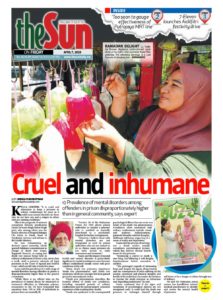HEADLINE-HUMAN RIGHTS | KUALA LUMPUR- Cruel and inhumane to keep prisoners in solitary confinement, says expert
.

KUALA LUMPUR: “It is cruel and inhumane to keep a prisoner in solitary confinement for years as it could cause mental disorders in those who do not have any and a relapse in others with pre-existing conditions.”
This is the prognosis of eminent consultant forensic psychiatrist Datuk Dr Suarn Singh Jasmit Singh, who among others was the former director of Hospital Bahagia Ulu Kinta in Perak, head of Psychiatric Services and adviser to the Health Ministry.
He was commenting on theSun’s report yesterday, which quoted Suhakam commissioner in charge of death row issues, Ragunath Kesavan, as saying that death row means being held in solitary confinement 24 hours a day, seven days a week, until a prisoner exhausts all legal processes at the Court of Appeal and Federal Court, which would take at least five years.
Suarn said the prevalence of a wide range of mental disorders among offenders in prison is disproportionately higher than in the general community.
“While there is no official data on the prevalence of mental illness for remanded or sentenced offenders in Malaysian prisons, researchers in the US have estimated that anywhere from 15% to 50% of individuals in prisons there are mentally ill.
“Section 36 of the Malaysian Prison Act 1995 allows prison authorities to transfer a prisoner who is certified as mentally disordered to a psychiatric hospital for further management.
“However, I believe those with mental disorders are not recognised as such by prison authorities who are not trained to do so. Hence, many prisoners do not have access to early assessment and treatment.”
Suarn said the impact of mental health and mental disorder is particularly significant in capital punishment cases because solitary confinement usually comes with poor conditions of the cell.
“Many death row prisoners experience ‘death row phenomenon’ and ‘death row syndrome’, which are concepts that have gained ground in international circles.
“Death row phenomenon describes the harmful effects of death row conditions, including extended periods of solitary confinement and the mental anxiety prisoners experience while awaiting their deaths.
“Death row syndrome is the consequential psychological illness that can occur as a result of the death row phenomenon. Conditions often associated with solitary confinement include visual and auditory hallucinations, paranoid disorder, suicidal thoughts, deliberate self-harm, anger, loss of a sense of reality and depression.”
Suarn said the process of carrying out a death verdict usually constitutes psychological torture, which has adverse mental health issues for the prisoner.
“Sentencing a convict to death is one thing, but following it with lengthy imprisonment before execution is another.
“The prolonged anguish of alternating hope and despair, the agony of uncertainty and the consequences of such suffering on the mental, emotional and physical integrity and health of the individual can render the decision to execute the death sentence an inhumane and degrading punishment,” he said.
Suarn cautioned that if the signs and symptoms of psychological distress are not recognised early, it could lead the death row prisoner to endanger himself through self-harm or be a danger to others through acts of violence.
He said the Malaysian prison system has insufficient trained medical practitioners to identify and assess the mental health of prisoners.
“In Malaysia, a mental state evaluation is generally not done for death row prisoners facing execution.
“Regular mental health evaluations of all death row prisoners and the institution of treatment, where appropriate, must be provided,” he stressed.
He also emphasised that any execution of a prisoner with a mental disorder is considered cruel punishment and degrading treatment, which is contrary to the “right to life” under Article 5(1) of our Federal Constitution, which prohibits the arbitrary deprivation of life.
Suarn said upon conviction by the High Court, death row prisoners are placed in solitary confinement with limited time, if any, outside of their cells.
“This is contrary to Rule 45 of the Nelson Mandela Rules whereby solitary confinement shall be used only in exceptional cases as a last resort, for as short a time as possible, and subject to independent review. It shall not be imposed by virtue of a prisoner’s sentence.
“Solitary confinement is the norm for these death row prisoners. But Rule 45(2) recognises its impact on mentally disordered prisoners and specifically prohibits them from being placed in solitary confinement as their conditions would be exacerbated by such measures,” he said.
Suarn said even Regulation 25(6) of the Malaysian Mental Health Regulations 2010 prohibits the seclusion of a mentally disordered person in psychiatric hospitals for more than eight hours consecutively or more than 12 hours intermittently over 48 hours without an independent review by a psychiatrist.
“Regulations 29 and 30 specify the conditions of any seclusion room and the recording of that seclusion. Under the Malaysian Prison Act and Regulations, the solitary confinement cell has no specifications and possibly could be in poor and inhumane condition.
“I call on the government, prison authorities and other relevant parties to look into these matters and uphold the laws, rules and regulations of solitary confinement. Death row prisoners are also human, no matter what they may have done. Let us treat them with some dignity before their deaths.”
 Ads by: Memento Maxima Digital Marketing
Ads by: Memento Maxima Digital Marketing
@[email protected]
SPACE RESERVE FOR ADVERTISTMENT


 Memento Maxima Digital Marketing
Memento Maxima Digital Marketing






